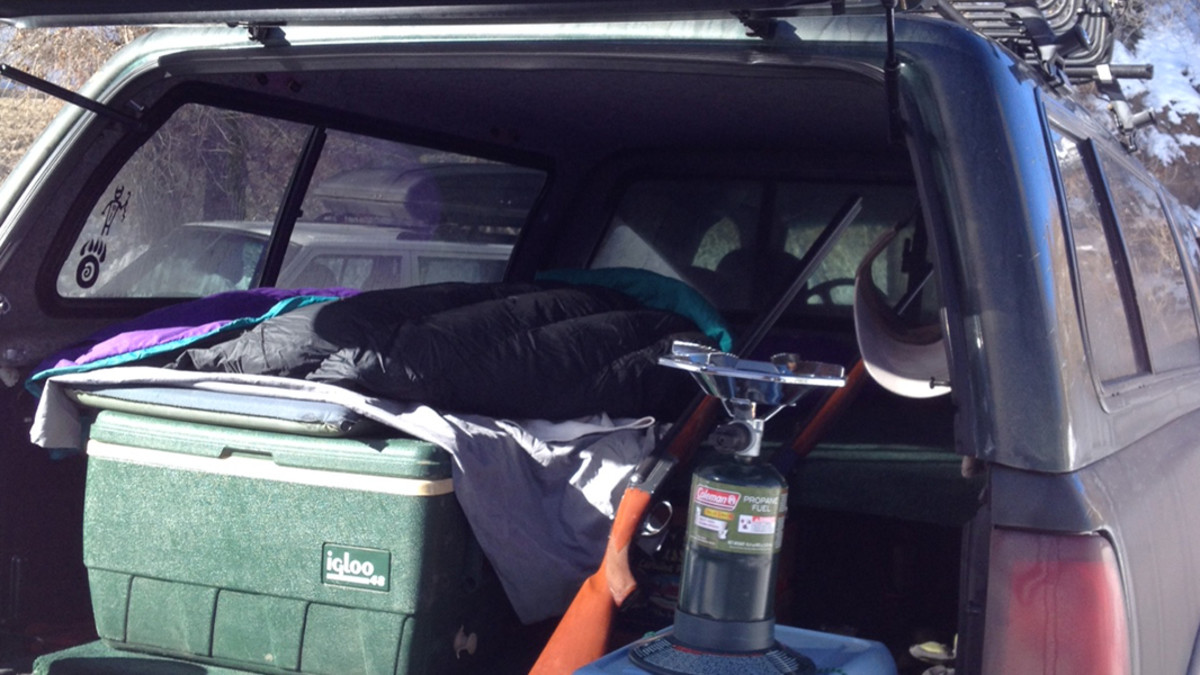
For whatever reason, it seems as though big game hunters are far more likely than small game hunters to hit the road and spend a few nights camping out in the field. That’s too bad, because road trips can be extremely productive for small game hunting, especially when you travel to areas that receive very little hunting pressure.
At various points in our lives, my brothers and I have done annual road trips for cottontail rabbits, quail, ducks, geese, and turkeys, and I count these forays as some of the most memorable small game hunts that I’ve been involved with. Unlike the kind of big game hunts that I enjoy, where I usually end up camping in backcountry locales far away from my vehicle, the best small game hunts are typically located in places where you camp right at your truck or car.
If you’ve got a pickup, you can rig it up with a sheet of reinforced plywood that rests on top of the wheel wells. This gives you plenty of room to sleep, the plywood makes a better bed than the steel floor of the bed, and it gives you a ton of gear storage down under. If you really want to trick out your camping rig, glue a layer of indoor/outdoor carpet to the top side of the plywood surface. You’ll be sleeping in style.
As for packing, keep a simple pre-packed car camping setup in your garage or closet so that hitting the road is as simple as loading a box into the back of your rig. You can think of your car-camping setup as being divided into four categories, sleeping gear, eating gear, field care gear, and odds n’ ends gear. Here’s a packing list that can form the basis for building your own small-game road trip kit.
Sleeping Gear
- Sleeping bag – a high quality 15-degree synthetic sleeping bag is a great all-around bag that will meet 90% of your hunting needs.
- Sleeping pad. The Nemo Tensor is a great lightweight insulated sleeping pad.
- Lightweight backpacking tent, unless you have a vehicle such as a pickup, SUV, or a wagon that allows you to stretch out in the back. Definitely avoid the temptation to spend a night slouched in the front seat of your car. The time you save by not pitching a tent will not make up for the horrible night of sleep and the cramped legs that you’ll wake up with.
Eating Gear
- 5-gallon Jerry can of water, or 2 gallons of per person/per day.
- Camp stove (Jetboil or or Coleman-style two-burner campstove).
- Stove fuel.
- Pot for heating water
- Small fry pan.
- Quality cooking tongs.
- Backpackers cup, bowl, spoon, and spork. (Snow Peak makes an excellent line of titanium products.)
- Coffee-making apparatus. (Though you should forego brewed coffee in exchange for Starbucks Via, which gives you more time in the woods and less time monkeying around in camp.)
- Plenty of non-perishable foods to get you through a few days of hard hunting. One or two Mountain House freeze dried meals per day, a few bags of jerky, cans of nuts, energy bars, instant oatmeal, dried salami, a bottle of cooking oil and prepackaged seasoning blend for frying grouse breasts and rabbit thighs.
Fieldcare Gear
- Poultry shears
- Zip-Lock bags
- Ice for the cooler
Odds n’ Ends Gear
- Medium-sized cooler for carrying beverages and perishable food items to the hunting location, and for carrying game meat back home.
- Small shovel (For digging catholes; don’t litter the woods or trailheads with exposed human waste.)
- Toilet paper. (Burn used toilet paper whenever possible. When it’s not possible, bury it deep.)
- Basic toiletries kit – toothbrush, toothpaste, etc.
- Headlamp and handheld flashlight
- Lighter and waterproof matches.
- Heavy down jacket and insulated bibs for hanging around camp on cold nights.



